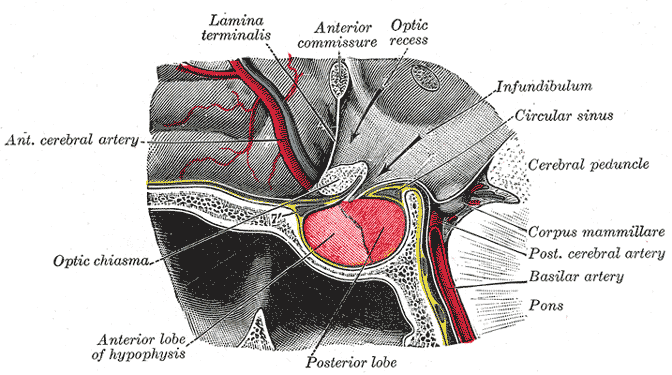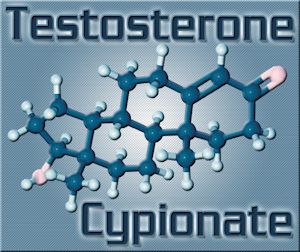Video Link: https://vimeo.com/290552351
Video Download: Click Here To Download Video
Video Stream: Click Here To Stream Video
Hypopituitarism is a medical condition in which the pituitary gland is unable to produce hormones that are normally produced by the gland sufficiently.
Several hormones are produced by the pituitary, and Hypopituitarism can refer to a deficiency in any individual hormone, as well as multiple hormones. This deficiency can be partial or total.
Many forms of Hypopituitarism, especially Total Hormone Deficiencies, are quite rare, whereas other, partial, and age-related types of Hypopituitarism, are more common.
What is the Pituitary Gland and Where is It Located?
The pituitary gland is located at the base of the human brain, it is relatively small, but it performs vital functions necessary to maintain hormone homeostasis. The pituitary is around the size and shape of a lima bean.
You can approximate the location of the pituitary gland by moving directly back from the nose to just behind the midpoint of the skull, right between the ears.

Although the pituitary is quite small, it has an enormous amount of influence on the body, with its reach extending to nearly every organ and physiological process of the body. Procedures that the pituitary gland is directly involved in include reproduction, blood pressure, and growth.
Hypopituitarism is a severe condition, and its effects depend on the particular hormone or hormones not being produced sufficiently.
In most cases, Hypopituitarism is chronic, meaning that it can't be cured, but can be adequately treated with Hormone Replacement Therapy, to the extent that the patient will not experience significant symptoms.
In many cases, Hypopituitarism starts slowly and progresses over time. For example, concerning Age-Related HGH Deficiency, around the age of thirty, Human Growth Hormone Levels drop around one percent per year.
For many patients, HGH Deficiency never becomes a significant issue, but for others, Hormone Levels start to lead to unwanted physiological changes.
Gradual Hormone Depletion associated with many forms of Hypopituitarism can go unnoticed or unrealized for years, often mistaken, undiagnosed, or simply brushed off as simple aging.
go unnoticed or unrealized for years, often mistaken, undiagnosed, or simply brushed off as simple aging.
Because Hypopituitarism refers to a class of Hormone Deficiencies, the symptoms that the patient experiences depend on which hormones are not being produced sufficiently and the severity of that deficiency. The following are some symptoms that patients may experience as a result of Hypopituitarism:
- Infertility
- Anemia
- Edema
- Loss of Appetite
- Issues with Temperature Regulation
- Loss of Libido
- Erectile Dysfunction
- Lack of Energy
- Weight Loss
- Weight Gain
- Muscle Atrophy
- Reduced Presence of Hair in Men
- Menstrual Issues or Breast-Feeding Issues in Women
- Growth Problems in Children
When Should I See a Doctor If I Show Symptoms of Hypopituitarism?
If you show signs of Hypopituitarism which onset abruptly, you need to visit a doctor or hospital immediately. If you experience a rapid decline in blood pressure, combined with changes in vision or a painful headache, this is a sign that bleeding in the brain is flooding the pituitary, and this could be potentially life-threatening.
Hypopituitarism Often the Result of Tumors

Hypopituitarism is sometimes a genetic issue that patients are born with, but it usually occurs as a result of illness or aging later in life. Severe Hypopituitarism of sudden onset is typically the result of a pituitary tumor, which limits the ability of the gland to produce one or more hormones.
Tumors may also suppress some hormones while leading to the over-production of one particular hormone. As the tumor grows, this can lead to migraines and visual issues, both the result of changes in pressure in the brain, or compression of nerves due to the growing tumor.
Causes of Hypopituitarism
Hypopituitarism is caused by any condition which suppresses the activity of the pituitary or damages the gland, including:
- Tuberculosis
- Brain Infection
- Stroke
- Inflammation
- Radiation
- Surgery
- Tumors
- Trauma
- Aging
- Hypothalamic Diseases
- Genetic Disorders
- Sometimes, the reason for Hypopituitarism is unclear.
How Do Doctors Diagnose Hypopituitarism?
If there is a reason to believe that you may be suffering from Hypopituitarism, your physicians can order several tests designed to measure your pituitary hormone levels or assess whether your body is responding to those hormones appropriately.
If you have experienced radiation or head trauma, your doctor may perform these tests to assess your hormone state before it becomes problematic.
Hypopituitarism Tests
Blood Testing – Hormones produced by the pituitary travel through the body via the bloodstream. Either by assessing the Hormone Concentrations directly or via their metabolites, it is possible to measure the activity of hormones produced by the Pituitary.
Hormone Stimulation Testing – These tests are performed to assess the ability of the pituitary to produce certain hormones, and can establish whether the Pituitary Insufficiency is the result of a malfunctioning Pituitary, or a Hypothalamic condition preventing the Pituitary from releasing hormones appropriately.
In these tests, the patient is dosed with certain chemicals which are known to stimulate the production of specific pituitary hormones directly.
Brain Scan – If the patient shows severe hypopituitarism signs, the doctor may order an MRI to assess the physical state of the brain. This testing will reveal any potential tumors or other abnormalities affecting the pituitary.
Visual Assessment – Because pituitary tumors can impair eyesight, Vision tests can provide evidence of tumors.
How Successful is Hypopituitarism Treatment?
In some cases, effective treatment may partially or totally restore the impaired Pituitary function. In other cases, the patient may require ongoing treatment for  Pituitary Insufficiency, which may be needed for the rest of the patient's life.
Pituitary Insufficiency, which may be needed for the rest of the patient's life.
In spite of the chronic condition, most patients can go on just as if their pituitary were functioning correctly because Hormone Replacement Therapy restores healthy hormone balance, which has been naturally impaired by Hypopituitarism.
Hypopituitarism Treatment
For patients with pituitary tumors, it will likely be necessary to undergo brain surgery or receive radiation treatments to destroy or remove the tumor. In the case of the Hormone Deficiency itself, the procedure will depend on which hormone or hormones are not being produced sufficiently.

Hormone Therapy Treatments:
Human Growth Hormone – This hormone is produced by cells known as Somatotrophs. In children, this hormone is necessary for healthy growth, and in adulthood, this hormone is required to maintain optimal cellular metabolism and cellular homeostasis.
Sex Hormone Replacement – For a regular function, men need testosterone, and women need estrogen (at least until menopause). Testosterone Replacement Therapy is available in many forms, including Low-T Injections, Patches, and Creams. Estrogen and Estrogen/Progesterone Therapy is generally administered via patch, gel, or pill.
Luteinizing Hormone and Follicle-Stimulating Hormone – For patients with Sex Hormone Deficiency that are interested in having children, Luteinizing Hormone and Follicle-Stimulating Hormone Therapy will be necessary. These hormones promote the production of sperm and ovulation, depending on sex.
Synthroid/Levothyroxine – For patients unable to produce Thyroid-Stimulating Hormone typically, these treatments can maintain the normal function of the Thyroid Gland.
Corticosteroids – These medications, which include Prednisone and Hydrocortisone, are designed to restore healthy adrenal hormone levels that are deficient as the result of ACTH Deficiency. These drugs can be taken orally.
Maintaining Hypopituitarism Treatment
As a patient is taking medication for Hypopituitarism, he or she will have to undergo an occasional evaluation to assess the safety and effectiveness of treatment. The goal of Hormone Replacement is to restore Hormone Levels to those that would be normal in a healthy patient. Too many of these hormones can also cause their own problems.
Also, certain medications may require the patient to take them in response to symptoms. Although HGH and Sex Hormones are generally produced in a steady pattern, for example, Corticosteroids are released in response to pain, stress, and other stimulation. The body produces cortisol as a direct response to these conditions.
Patients with Pituitary Deficiencies can live perfectly healthy lives. All hormones produced by the pituitary have Bio-Identical or Functionally Identical analogs which can be used to mimic the normal function and release of hormones by the pituitary.
Reference
Diagnosis and Treatment of Hypopituitarism
Contact Us Today For A Free Consultation

- Is There Such a Thing as Too Much HGH? [Last Updated On: March 16th, 2025] [Originally Added On: August 22nd, 2023]
- Unveiling the Cardiovascular Implications of Hypopituitarism in American Males [Last Updated On: March 1st, 2025] [Originally Added On: March 1st, 2025]
- Hypopituitarism in American Men: Impacts and Management Strategies [Last Updated On: March 10th, 2025] [Originally Added On: March 10th, 2025]
- Hypopituitarism and Metabolic Syndrome: Unraveling the Connection in American Males [Last Updated On: March 16th, 2025] [Originally Added On: March 16th, 2025]
- Unveiling the Cardiovascular Risks: The Link Between Hypopituitarism and Heart Disease in American Males [Last Updated On: March 16th, 2025] [Originally Added On: March 16th, 2025]
- Unraveling the Connection: Hypopituitarism and Uterine Fibroids in American Males [Last Updated On: March 16th, 2025] [Originally Added On: March 16th, 2025]
- Exploring Hypopituitarism's Impact on Vaginal Health and the Female Reproductive System [Last Updated On: March 16th, 2025] [Originally Added On: March 16th, 2025]
- Unraveling the Hormonal Link: Hypopituitarism and Breast Cancer in American Males [Last Updated On: March 16th, 2025] [Originally Added On: March 16th, 2025]
- Hypopituitarism and Autoimmune Disorders: Critical Insights for American Males [Last Updated On: March 16th, 2025] [Originally Added On: March 16th, 2025]
- Hypopituitarism and Obesity in American Males: Hormonal Impacts and Management Strategies [Last Updated On: March 17th, 2025] [Originally Added On: March 17th, 2025]
- Hypopituitarism in American Males: Hormonal Imbalances and Sleep Disorder Connections [Last Updated On: March 18th, 2025] [Originally Added On: March 18th, 2025]
- Surgical Interventions for Hypopituitarism and Pituitary Tumors in American Males [Last Updated On: March 19th, 2025] [Originally Added On: March 19th, 2025]
- Hypopituitarism's Impact on Mental Health in American Males: Depression, Anxiety, and Treatment [Last Updated On: March 19th, 2025] [Originally Added On: March 19th, 2025]
- Multidisciplinary Care Essential for Managing Hypopituitarism in American Males [Last Updated On: March 20th, 2025] [Originally Added On: March 20th, 2025]
- Hypopituitarism in American Males: Cancer Risks and Monitoring Strategies [Last Updated On: March 21st, 2025] [Originally Added On: March 21st, 2025]
- Hypopituitarism and Anemia in American Males: The Critical Role of EPO Deficiency [Last Updated On: March 21st, 2025] [Originally Added On: March 21st, 2025]
- Hypopituitarism and Male Hair Loss: Hormonal Mechanisms and Treatment Strategies [Last Updated On: March 21st, 2025] [Originally Added On: March 21st, 2025]
- Hypopituitarism's Impact on Kidney Function in American Males: Monitoring and Management [Last Updated On: March 21st, 2025] [Originally Added On: March 21st, 2025]
- Hypopituitarism's Impact on Immune Function in American Men: Diagnosis, Treatment, and Management [Last Updated On: March 21st, 2025] [Originally Added On: March 21st, 2025]
- Hypopituitarism in American Males: Cognitive Impacts and Management Strategies [Last Updated On: March 22nd, 2025] [Originally Added On: March 22nd, 2025]
- Hypopituitarism in American Males: Impact on Eye Health and Visual Impairments [Last Updated On: March 22nd, 2025] [Originally Added On: March 22nd, 2025]
- Hypopituitarism in Aging American Males: Impact, Diagnosis, and Management Strategies [Last Updated On: March 22nd, 2025] [Originally Added On: March 22nd, 2025]
- Hypopituitarism's Impact on Liver Health in American Males: Hormonal Deficiencies and Management [Last Updated On: March 22nd, 2025] [Originally Added On: March 22nd, 2025]
- Hypopituitarism's Impact on Joint Health in American Males: Diagnosis and Management [Last Updated On: March 22nd, 2025] [Originally Added On: March 22nd, 2025]
- Hypopituitarism's Impact on GI Health in American Males: Digestion and Nutrient Absorption [Last Updated On: March 23rd, 2025] [Originally Added On: March 23rd, 2025]
- Hypopituitarism's Impact on Skin Health in American Males: Symptoms and Management [Last Updated On: March 23rd, 2025] [Originally Added On: March 23rd, 2025]
- Hypopituitarism and Seizure Disorders in American Males: Clinical Insights and Management [Last Updated On: March 23rd, 2025] [Originally Added On: March 23rd, 2025]
- Hypopituitarism and Migraines: Hormonal Links and Management Strategies for American Men [Last Updated On: March 23rd, 2025] [Originally Added On: March 23rd, 2025]
- Hypopituitarism and Hypertension: Impact on Blood Pressure in American Males [Last Updated On: March 23rd, 2025] [Originally Added On: March 23rd, 2025]
- Hypopituitarism's Link to Gout and Uric Acid in American Males: A Comprehensive Analysis [Last Updated On: March 23rd, 2025] [Originally Added On: March 23rd, 2025]
- Hypopituitarism's Impact on Muscle Strength in American Males: Management and Insights [Last Updated On: March 24th, 2025] [Originally Added On: March 24th, 2025]
- Autoimmune Link: Hypopituitarism and Rheumatoid Arthritis in American Males [Last Updated On: March 24th, 2025] [Originally Added On: March 24th, 2025]
- Exploring the Link Between Hypopituitarism and MS in American Males [Last Updated On: March 24th, 2025] [Originally Added On: March 24th, 2025]
- Autoimmune Link Between Hypopituitarism and Celiac Disease in American Males [Last Updated On: March 24th, 2025] [Originally Added On: March 24th, 2025]
- Hypopituitarism and Diabetes: Impact on Glucose Metabolism in American Males [Last Updated On: March 25th, 2025] [Originally Added On: March 25th, 2025]
- Hypopituitarism's Impact on Kidney Health in American Males: Monitoring and Management [Last Updated On: March 25th, 2025] [Originally Added On: March 25th, 2025]
- Hypopituitarism and Hearing Loss: Exploring Links and Implications for American Males [Last Updated On: March 25th, 2025] [Originally Added On: March 25th, 2025]
- Hypopituitarism in American Males: Cardiovascular Risks and Management Strategies [Last Updated On: March 25th, 2025] [Originally Added On: March 25th, 2025]
- Hypopituitarism's Impact on Asthma in American Males: Hormonal Insights and Management [Last Updated On: March 25th, 2025] [Originally Added On: March 25th, 2025]
- Hypopituitarism and Allergies: Hormonal Impacts on Immune Response in American Men [Last Updated On: March 26th, 2025] [Originally Added On: March 26th, 2025]
- Hypopituitarism's Role in Accelerating Parkinson's Disease in American Males [Last Updated On: March 26th, 2025] [Originally Added On: March 26th, 2025]
- Hypopituitarism and Liver Cirrhosis: Impacts and Management in American Males [Last Updated On: March 26th, 2025] [Originally Added On: March 26th, 2025]
- Hypopituitarism and CFS Overlap in American Males: Symptoms, Mechanisms, and Clinical Insights [Last Updated On: March 26th, 2025] [Originally Added On: March 26th, 2025]
- Hypopituitarism and Fibromyalgia: Overlapping Symptoms and Impact on American Males [Last Updated On: March 26th, 2025] [Originally Added On: March 26th, 2025]
- Hypopituitarism, Hormonal Imbalances, and Alzheimer's Risk in American Males [Last Updated On: March 26th, 2025] [Originally Added On: March 26th, 2025]
- Hypopituitarism and Sjögren's Syndrome: Effects on Exocrine Glands in American Males [Last Updated On: March 26th, 2025] [Originally Added On: March 26th, 2025]
- Hypopituitarism and Dyslipidemia: Impacts on American Males' Health and Management Strategies [Last Updated On: March 26th, 2025] [Originally Added On: March 26th, 2025]
- Hypopituitarism's Impact on Prostate Cancer in American Males: Diagnosis and Management [Last Updated On: March 26th, 2025] [Originally Added On: March 26th, 2025]
- Exploring the Link Between Hypopituitarism and Lupus in American Males [Last Updated On: March 27th, 2025] [Originally Added On: March 27th, 2025]
- Hypopituitarism and Pituitary Cancer: Early Detection and Management for American Males [Last Updated On: March 27th, 2025] [Originally Added On: March 27th, 2025]
- Hypopituitarism in American Males: Monitoring Hormones to Reduce Stroke Risk [Last Updated On: March 27th, 2025] [Originally Added On: March 27th, 2025]
- Hypopituitarism and IBD: Gastrointestinal Links and Impacts on American Males [Last Updated On: March 27th, 2025] [Originally Added On: March 27th, 2025]
- Hypopituitarism and Adrenal Cancer: Endocrine Links in American Males [Last Updated On: March 27th, 2025] [Originally Added On: March 27th, 2025]
- Hypopituitarism and Osteoarthritis: Impact on Joint Health in American Males [Last Updated On: March 28th, 2025] [Originally Added On: March 28th, 2025]
- Hypopituitarism and Gallbladder Disease: Exploring Links in American Males [Last Updated On: March 29th, 2025] [Originally Added On: March 29th, 2025]
- Hypopituitarism's Impact on Pancreatitis: Risks and Management for American Males [Last Updated On: March 29th, 2025] [Originally Added On: March 29th, 2025]
- Hypopituitarism and Breast Cancer Link in American Males: Hormonal Insights and Clinical Implications [Last Updated On: March 30th, 2025] [Originally Added On: March 30th, 2025]
- Hormonal Imbalances in Hypopituitarism and Thyroid Cancer: Impacts on American Males [Last Updated On: March 30th, 2025] [Originally Added On: March 30th, 2025]
- Hypopituitarism and Testicular Cancer: Impacts and Fertility Preservation Strategies [Last Updated On: March 31st, 2025] [Originally Added On: March 31st, 2025]
- Hypopituitarism and Ovarian Cancer: Exploring Hormonal Links in American Males [Last Updated On: March 31st, 2025] [Originally Added On: March 31st, 2025]
- Hypopituitarism in American Males: Hormonal Imbalances and Benign Tumor Risks [Last Updated On: April 4th, 2025] [Originally Added On: April 4th, 2025]
- Hypopituitarism and PCOS: Symptoms, Diagnosis, and Management Strategies [Last Updated On: April 4th, 2025] [Originally Added On: April 4th, 2025]
- Hormonal Links Between Hypopituitarism and Endometriosis in American Males Explored [Last Updated On: April 5th, 2025] [Originally Added On: April 5th, 2025]
- Hypopituitarism and Erectile Dysfunction: Hormonal Links and Holistic Management in American Males [Last Updated On: April 6th, 2025] [Originally Added On: April 6th, 2025]
- Hypopituitarism: Effects on Male Reproductive and Penile Health [Last Updated On: April 8th, 2025] [Originally Added On: April 8th, 2025]
- Hypopituitarism, Hormonal Imbalance, and Cervical Cancer Risk in Men [Last Updated On: April 8th, 2025] [Originally Added On: April 8th, 2025]
- Hypopituitarism's Impact on Female Reproductive and Vaginal Health: Diagnosis and Management [Last Updated On: April 9th, 2025] [Originally Added On: April 9th, 2025]
- Hypopituitarism and Premature Ejaculation: Exploring Hormonal Links in American Males [Last Updated On: April 10th, 2025] [Originally Added On: April 10th, 2025]
- Hypopituitarism's Impact on Miscarriage Risk and Male Fertility in America [Last Updated On: April 10th, 2025] [Originally Added On: April 10th, 2025]
- Hypopituitarism and Preeclampsia in Pregnancy: Monitoring and Management Strategies [Last Updated On: April 10th, 2025] [Originally Added On: April 10th, 2025]
- Hypopituitarism and Ectopic Pregnancy: Impacts and Management in Women's Health [Last Updated On: April 11th, 2025] [Originally Added On: April 11th, 2025]
- Hypopituitarism and Male Infertility: Causes, Diagnosis, and Treatment Options [Last Updated On: April 11th, 2025] [Originally Added On: April 11th, 2025]
- Hypopituitarism and Gestational Diabetes: Metabolic Links in American Males [Last Updated On: April 11th, 2025] [Originally Added On: April 11th, 2025]
- Hypopituitarism's Impact on Lactation: Support Strategies for American Males [Last Updated On: April 12th, 2025] [Originally Added On: April 12th, 2025]
- Hypopituitarism's Impact on Mental Health and Postpartum Depression in American Males [Last Updated On: April 15th, 2025] [Originally Added On: April 15th, 2025]
- Hormonal Imbalances in Women: Hypopituitarism, Menopause, and Supportive Roles for American Males [Last Updated On: April 15th, 2025] [Originally Added On: April 15th, 2025]
- Hypopituitarism's Impact on Dental Health in American Males: Monitoring and Care Strategies [Last Updated On: April 16th, 2025] [Originally Added On: April 16th, 2025]
- Hypopituitarism and Andropause: Impacts and Management in Aging American Males [Last Updated On: April 16th, 2025] [Originally Added On: April 16th, 2025]
- Hypopituitarism and Alopecia: Impact on Male Hair Health and Treatment Strategies [Last Updated On: April 16th, 2025] [Originally Added On: April 16th, 2025]
- Hypopituitarism in American Males: Nail Health as a Dermatological Indicator [Last Updated On: April 17th, 2025] [Originally Added On: April 17th, 2025]
Word Count: 1312




















